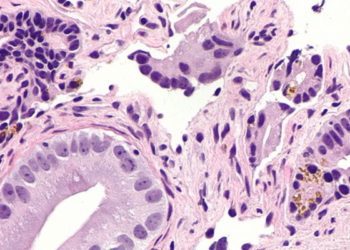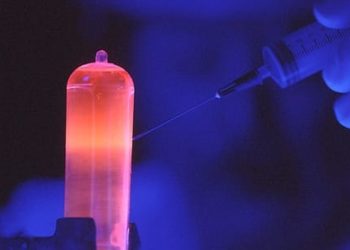#VisualAbstract: Adjuvant radiotherapy may worsen outcomes compared to salvage radiotherapy post radical prostatectomy
1. Adjuvant radiotherapy was found to increase the risk of urinary incontinence and urethral strictures compared to salvage radiotherapy in patients with prostate cancer.
2. Adjuvant radiotherapy did not show any benefit in biochemical control or time to hormone therapy following radical prostatectomy, compared to salvage radiotherapy.
Evidence Rating Level: 1 (Excellent)
Study Rundown: There is mixed evidence around the timing of postoperative radiotherapy for radical prostatectomy. While some studies suggest that early treatment with adjuvant radiotherapy may alleviate the risk of prostate cancer recurrence, others note that such a precautionary approach may contribute to treatment-related morbidity. Equally compelling evidence exists for salvage radiotherapy – an observatory approach that recommends radiotherapy only for men who develop an elevated prostate-specific antigen (PSA) level post-surgery. This phase 3, multicenter, randomized controlled trial aimed to compare the safety and efficacy of adjuvant radiotherapy versus salvage radiotherapy for PSA biochemical progression among patients with recent radical prostatectomy. The primary outcome for this study was disease-specific survival and freedom-from-distant metastases (i.e. bone, liver, lung, distant node and other metastases), whereas secondary outcomes included initiation of non-protocol hormone therapy, treatment toxicity, and freedom from biochemical progression. The study results demonstrated that adjuvant radiotherapy was not superior to salvage radiotherapy for biochemical progression-free survival at five years and was associated with greater urinary complications. The randomized controlled trial was limited by a lack of clinical markers measured. Comparing the blood pressure and blood glucose levels among patients could have helped to characterize and distinguish between the forms of radiotherapy. Nonetheless, this is the largest international randomized controlled trial assessing the safety and efficacy of adjuvant radiotherapy versus salvage radiotherapy to date.
Click to read the study in The Lancet
Click to read an accompanying editorial in The Lancet
Relevant Reading: Adjuvant vs Salvage Radiation Therapy for High-Risk Prostate Cancer Following Radical Prostatectomy
In-depth [randomized controlled trial]: Between Nov 22, 2007 and Dec 30, 2016, 1396 patients were enrolled into this study from 138 centers in Canada, Denmark, Ireland, and the UK. The eligibility criteria included recent history of radical prostatectomy, postoperative PSA ≤ 0.2 ng/mL, and at least one of the following risk factors: T-stage 3-4, Gleason score 7-10, positive margins, or preoperative PSA ≥ 10 ng/mL. Patients were randomly assigned to the adjuvant radiotherapy group (n=697, 50%) or the salvage radiotherapy group (n=699, 50%) and were followed for median of 4.9 years (IQR 3.0-6.1). The median patient age was 65 years (IQR 60-68), at baseline, and median PSA at diagnosis was 7.9 ng/mL.
Among 697 patients in the adjuvant radiotherapy group, 647 (93%) began radiotherapy within 6 months after randomization (median 4.9 months, IQR 4.1-5.7), whereas only 228 of 699 patients (33%) in the salvage radiotherapy group began treatment within 8 years. More patients in the adjuvant radiotherapy group (15 of 228, 7%) received radiotherapy to the pelvic lymph nodes than in the salvage radiotherapy group (21 of 649, 3%). Compared to the salvage radiotherapy group, patients who received adjuvant radiotherapy reported worse urinary incontinence at 1 year after randomization (mean score 4.0 vs. 4.8, p=0.0023), and had more frequent grade 3-4 urethral stricture within 2 years (4% vs. 6%, p=0.020). Urinary incontinence was scored from 0-24, with 0 being the best and 24 being the worst. Patients with adjuvant radiotherapy had a worse prognosis for grade 3-4 hematuria in the first 2 years post-randomization (3% vs. <1%) and thereafter (4% vs. <1%). Minimal differences were noted with respect to 5-year biochemical progression-free survival (88% for salvage radiotherapy vs. 85% for adjuvant radiotherapy, hazard ratio [HR] 1.10, 95% confidence interval [CI] 0.81-1.49, p=0.56) and freedom from non-protocol hormone therapy at 5 years (92% for salvage radiotherapy vs. 93% for adjuvant radiotherapy, HR 0.88, 95% CI 0.58-1.33, p=0.53). A hazard ratio less than 1 favoured adjuvant radiotherapy. Overall, findings from this study suggest that observation with salvage treatment for PSA biochemical progression should be the standard of care for patients treated with radical prostatectomy.
Image: PD
©2020 2 Minute Medicine, Inc. All rights reserved. No works may be reproduced without expressed written consent from 2 Minute Medicine, Inc. Inquire about licensing here. No article should be construed as medical advice and is not intended as such by the authors or by 2 Minute Medicine, Inc.

![2 Minute Medicine: Pharma Roundup: Price Hikes, Breakthrough Approvals, Legal Showdowns, Biotech Expansion, and Europe’s Pricing Debate [May 12nd, 2025]](https://www.2minutemedicine.com/wp-content/uploads/2025/05/ChatGPT-Image-May-12-2025-at-10_22_23-AM-350x250.png)





